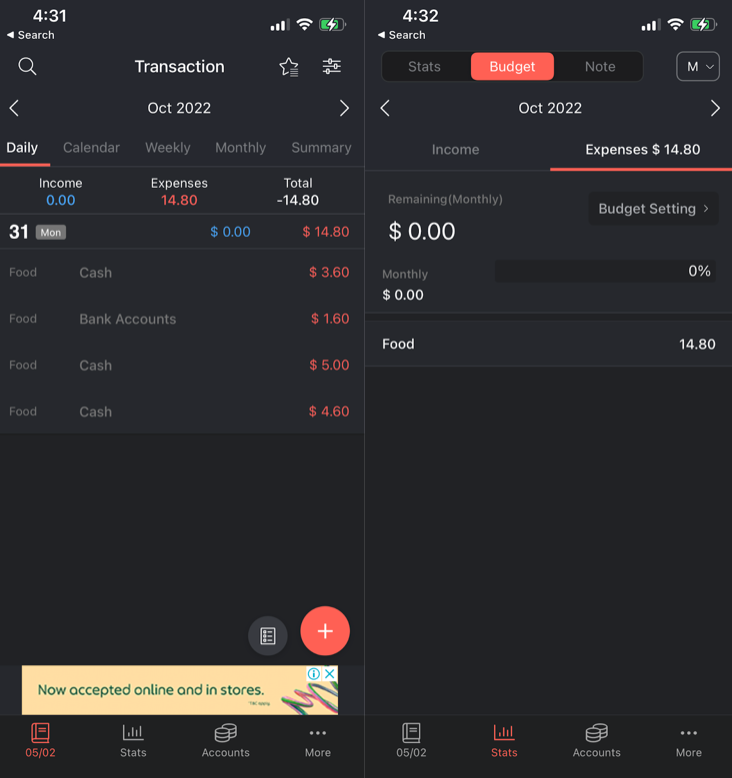
Familiar with the saying, “Money doesn’t grow on trees”? My elders used to say this to me all the time. I didn’t fully comprehend what that meant at the time until I grew older and realised that making money and saving it is not as simple as I thought it was.
As a student, it is difficult to become financially independent, even with a part-time job. That said, we should at least learn to save money for a rainy day – it is always better to be prepared than to be overwhelmed (when the time comes).
After speaking to other students (plus stories from my own experience), here are five practical ways to set yourself up for a better financial future.
Creating a budget

Photo credit: Verlene Koh
You can start by setting a goal such as saving $50 a month. Depending on your cash flow situation, you can set a comfortable amount (I’d recommend starting with 20% of your savings). I used to spend money outside of the budget range I’ve set which led to cutting my expenses on things such as entertainment. So I told myself that I need to start keeping track of my expenses.
Creating a budget can be a long-term goal. 19-year-old Farah Atiqah has already started to plan for her future. Despite being the youngest in the family, Farah takes on the responsibility to give back to her parents. “At this point in my life, it’s the time where I have to slowly start becoming financially independent and not depend on my parents,” Farah mentioned.
As she ends her final year in Singapore Polytechnic (SP), Farah is planning to further her studies and attend part-time courses – all of which require a sum of money. Luckily for her, she started saving from a young age, including habits such as setting aside 20% of her allowance and acquiring a digital wallet. “A life hack for Gen Zs is that you can deposit your savings into [DBS] PayLah!,” said Farah on a tip that has helped her save.
Living frugally is also an essential aspect of saving money as a student. It means living below your means and cutting down on luxury expenses. This is when budgeting comes in handy — though it may require you to make some sacrifices, it will be worth it in the end!
Make the most of what you have
Let me share with you a trick to spend less on things like accessories and food! You can try cooking your own meals at home, learning from online tutorial videos or just by asking the chef of your family. I have saved so much more by cooking for myself. You do not need expensive ingredients for food to taste better and you get to save on groceries too.
You can also mix & match the clothes that you already own for a more stylish look. You’d be surprised to see how many types of outfit you can create with the same items.
paired with the same pants. Photo Credit: Danial Roslan
Everything gets easier with practice. Over time, you will get a better understanding of making use of what you already have such as common items you can find at home. The goal is to become more aware of your purposeful everyday habits in managing your finances.
Earning your keep
Another way to increase your savings is to find ways to earn extra money. Whether through a part-time job, freelancing, or selling items you no longer need, having a regular source of income can make one feel more confident about financial planning.
Speaking from experience, I used to be a part-time barista and I learned to schedule my working hours after school or on the weekends. This is important so that your work doesn’t get in the way of your studies. Working part-time also taught me to have better time management and to continue persevering, knowing that I could earn some income for the day.
For 25-year-old Koh Wen Qiang, he is currently working part-time as an Assistant Manager at McDonald’s, which has allowed him to be financially independent. Instead of spending excessively on the things that he wants, “The money I earn is [just] enough to cover my daily expenses,” Wen Qiang remarked.
maximising his spare time to financially support himself. Photo Credit: Koh Wen Qiang
As someone who has gone through the struggles of financial transition into adulthood, Wen Qiang understands that spending money on things we want can be tempting. However, he continues to make the effort to save no matter the amount as it will accumulate overtime. “To some, it doesn’t make a difference but to me, [saving] $0.10 or $0.20 makes a huge difference.”
Have you also wondered about what you can do with the skills you have? By freelancing, you can put your skills to the test! Personally, I made use of my editing skills that I picked up in school and made it a side hustle to edit simple video montages or TikTok content. I used platforms like Fiverr or just simply asked content creators around me if they needed a video editor.
Finding student deals and discounts
If you don’t already know, there are many benefits of being a student such as student privileges. For example, there is a Spotify plan just for students and it allows you to listen to ad-free music with unlimited streaming time.
I regret not doing more research on them in the past (I was too lazy!). But making use of these student perks can really help you to save quite a bit while having fun.

As some of these student perks are not explicitly mentioned, many students miss out on them. So if you’ve been paying $9.90 a month, it’s time to switch to the cheaper student plan before you become a full-fledged adult!
Having your meals in school or making use of student discounts in restaurants can also help reduce your expenses. Just remember to always have your student card with you for verification purposes as most restaurants will ask for it! Some places you can make use of these at include Eighteen Chefs and Pepper Lunch.
One more thing, if you are planning to catch a movie with your friends or family, tickets for students cost between $6 and $8 before 6pm on weekdays. Enjoy your student privileges while it lasts!
Make use of money-saving apps
Another great way to save money is to use technology to track your savings. An app that I’ve been using is called “Money Manager”.

On the app, I am able to track my expenses and view my past transactions. By keeping track of what I spend on helps me to be more mindful of what I should be spending on in the future. Since it worked for me, I hope it will work for you as well!
There will be times when you may forget to update your spendings due to your busy schedules. You can avoid this by placing the application on your homepage or as a widget. By doing this, Money Manager is the first app that catches my attention every time I use my phone. Alternatively, you can also set daily reminders to update your expenses.
Finally, saving money as a student has its challenges and inconveniences. If you feel like you are not making progress, be patient with yourself – starting is always the hardest part. With these tips, you can give it a go now (better late than never!).
Proofread by: Danial Roslan and Kimberley Caleon
